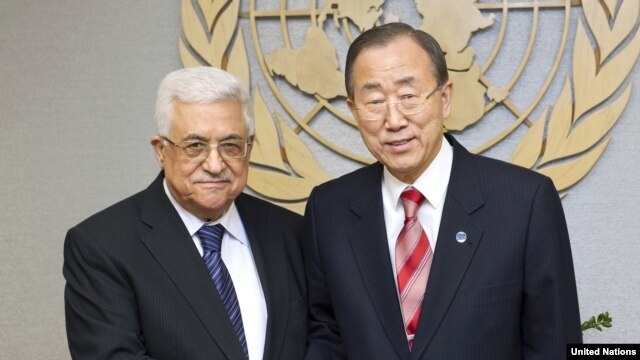UN chief warns Israeli settlements would be 'fatal blow'
| Publisher | Radio Free Europe/Radio Liberty |
| Publication Date | 3 December 2012 |
| Cite as | Radio Free Europe/Radio Liberty, UN chief warns Israeli settlements would be 'fatal blow', 3 December 2012, available at: https://www.refworld.org/docid/50c2099219.html [accessed 4 June 2023] |
| Disclaimer | This is not a UNHCR publication. UNHCR is not responsible for, nor does it necessarily endorse, its content. Any views expressed are solely those of the author or publisher and do not necessarily reflect those of UNHCR, the United Nations or its Member States. |
December 03, 2012
By RFE/RL
 UN Secretary-General Ban Ki-moon (right) met on November 28 with Palestinian leader Mahmud Abbas at UN headquarters in New York.
UN Secretary-General Ban Ki-moon (right) met on November 28 with Palestinian leader Mahmud Abbas at UN headquarters in New York.
United Nations Secretary-General Ban Ki-moon has warned it would be an "almost fatal blow" to peace prospects if Israel builds thousands of new housing units for Jewish settlers on land the Palestinians want for a future state.
A UN statement said Israel's plans for building 3,000 new settlement units would risk "completely cutting off" East Jerusalem from the rest of the West Bank.
Israel's building announcement on November 30 came a day after the UN General Assembly overwhelmingly voted to upgrade the Palestinians' UN status from "observer entity" to "nonmember state."
Israel intensified the pressure on the Palestinians on December 2, with the cabinet announcing it was withholding some $100 million in taxes and other revenues that Israel collects on behalf of the Palestinian Authority.
In another development, Palestinian National Authority President Mahmud Abbas returned to the West Bank from the United Nations in New York and declared: "Now we have a state."
"Congratulations to all of you brave Palestinians – you alone have accomplished this achievement and alone have won this victory," he told supporters.
Abbas pledged to now turn his attention to achieving reconciliation between Palestinians.
This was a reference to the split between the two main Palestinian political factions – Abbas's Fatah, which governs the West Bank, and the Islamist movement Hamas, which rules the Gaza Strip.
Hamas militants, who say they seek Israel's destruction and frequently fire missiles at Israel, are not regarded as possible peace partners by Israel and its ally the United States.
In his statement criticizing Israel's building plan, UN chief Ban said, "Settlements are illegal under international law."
He said that should the Israeli plan be carried out, "it would represent an almost fatal blow to remaining chances of securing a two-state solution."
Ban's statement echoed earlier condemnations by the United States, Britain, France, and the European Union, who warned the Israeli plan could scuttle peace moves.
Speaking at a cabinet meeting on December 2, Prime Minister Benjamin Netanyahu brushed off the criticism, vowing Israel would continue to build in Jerusalem.
The Israeli government considers all of Jerusalem, including the eastern part that Palestinians want for a capital, to be Israel's capital.
"Today we are building and we will continue to build in Jerusalem and in all areas that are on the state of Israel's map of strategic interests," Netanyahu said.
The Israeli cabinet declared that last week's UN vote upgrading the Palestinians' recognition would have no influence on any future negotiations between Israel and the Palestinians.
Concerning the withholding of tax funds due to the Palestinians, Israeli Finance Minister Yuval Steinitz said the money would instead be used to pay down the Palestinian Authority's debt to the Israeli electricity company and other Israeli entities.
Yasser Abed Rabbo, a senior Palestinian official, condemned the Israeli confiscation as "piracy and theft."
Palestinians say the monthly tax transfers from Israel are crucial for the cash-poor Palestinian Authority to pay salaries to tens of thousands of government employees and security forces.
With reporting from Reuters, AFP, and AP
Link to original story on RFE/RL website
